Carbon-neutral coating could give new life to ailing sewer pipes

Researchers at the University of British Columbia have developed an eco-friendly spray-on coating that could extend the lifespan of sewage systems by decades.
Made entirely of recycled materials, the protective coating wards off acid-producing bacteria that break down concrete sewer pipes over time.
“Cities spend millions of dollars repairing and replacing corroded underground concrete piping, which can cause roads and other structures to collapse if left untreated,” says Dr. Nemy Banthia, a civil engineering professor in the faculty of applied science and Canada Research Chair in Infrastructure Rehabilitation and Sustainability, who directed the work. “There has long been a need for a more effective way to deal with this global problem.”
An unforgiving environment
Sewers are harsh ecosystems, teeming with wastewater gases and bacteria that colonize the concrete surfaces around them. These bacteria turn the ambient gases into sulfuric acid, a corrosive agent that attacks not just the concrete, but also the steel bars that are used to strengthen it. As the pipes crack and crumble, cities face issues ranging from service interruptions to potentially fatal structural failures.
Traditional coatings do not last long in this environment, showing signs of deterioration in a matter of months. What’s more, they usually contain carbon-intensive materials like Portland cement, the production of which accounts for up to seven per cent of greenhouse gas emissions worldwide.
Dr. Banthia’s team set out to create a better coating — one that is not only effectual, but also long-lasting, easy to apply and environmentally safe.
Strong, safe and sustainable
Testing on sample materials was carried out over a two-year period using a special “bio-corrosion chamber” designed and built by the researchers, which enabled them to subject the materials to an accelerated version of real-world bio-corrosion processes.
What they developed is a durable, sprayable coating composed of industrial byproducts such as blast-furnace slag and fly ash, millions of tonnes of which are produced by the steel and coal power sectors every year. Fortified with biocides, it withstood corrosion in lab tests for about 45 per cent longer than conventional formulations did.
The non-toxic coating even rehabilitated old, heavily corroded sewerage, restoring it to near-pristine condition.
From the lab to the field
The team is now collaborating with Metro Vancouver to see how well the coating performs out in the field.
According to the Federation of Canadian Municipalities, a $50 billion investment will be required to renew ailing municipal water and wastewater infrastructure in Canada. This UBC innovation could dramatically reduce the frequency and expense of repairs and replacements, potentially saving billions in Canadian taxpayer dollars.
“The ultimate goal is to allow cities to apply the pipe coating remotely, using smart robotic placement technology. This would eliminate the need for costly construction and associated traffic delays,” says Dr. Banthia. “Considering there are over 9,000 kilometres of sewer pipes in Metro Vancouver alone, and many thousands more around the world, the benefits — human, environmental, economic — could be immense.”
Dr. Banthia, who also serves as the scientific director of IC-IMPACTS — a UBC-based Canada-India Research Centre of Excellence that co-funded the research — foresees numerous applications of this technology in India in particular.
“With an infrastructure budget of $1.3 trillion over the next five years, India will remain a lucrative export market for Canadian technologies like this.”
The project was carried out in partnership with Ocean Concrete and Metro Testing + Engineering.


